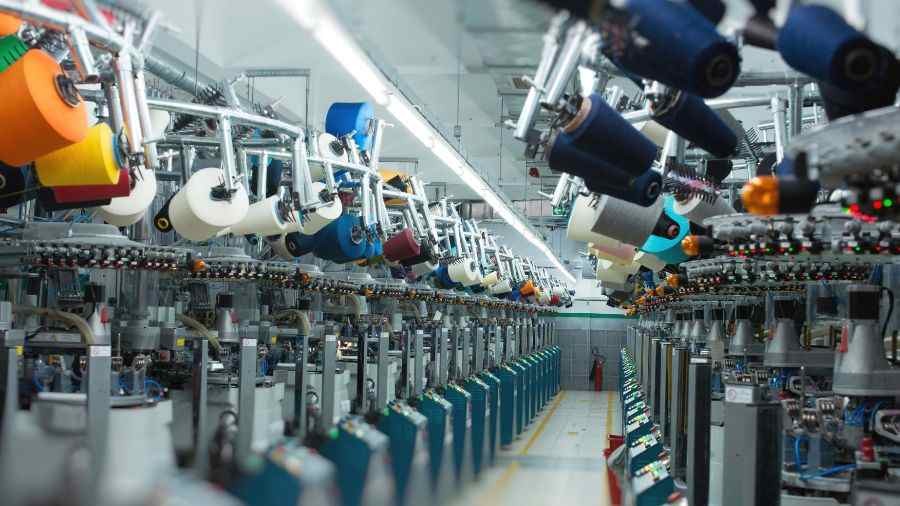Pakistan's Textile Industry Surges - Unveiling Market Trends and Opportunities

Image: Collected
Pakistan's textile industry is currently on an upward trajectory, signaling a significant shift in the country's economic landscape. The surge in growth is attributed to the combined efforts of textile manufacturers, fabric producers, garment factories, and cotton mills, marking a pivotal moment for the industry.
Recent data showcases the robust growth of Pakistan's textile sector, highlighting its resilience amidst global economic shifts. The industry's adaptability and innovation have led to increased production across various segments, positioning it as a crucial player in the international market.
Textile manufacturers in Pakistan are playing a crucial role in this surge. Their commitment to quality and innovative manufacturing processes has resulted in a substantial increase in production volumes. This not only addresses domestic demands but also solidifies Pakistan's standing in the global textile market.
Fabric producers, too, have been instrumental in driving industry growth. Focused on diversification and sustainable practices, they contribute not only to meeting market demands but also to environmental stewardship. This strategic approach has enhanced market share and global competitiveness.
Garment factories, an integral part of the textile industry, have experienced a surge in orders and production. This underscores Pakistan's proficiency in garment manufacturing, adapting to evolving consumer preferences and meeting international market demands.
The revival of cotton mills in Pakistan has played a crucial role in the industry's resurgence. With a renewed emphasis on quality raw materials, cotton mills have addressed supply chain challenges, contributing to a more robust and sustainable textile ecosystem.
Analyzing the current scenario, industry experts predict sustained growth for Pakistan's textile industry. Market trends suggest a favorable environment for investors and businesses, positioning the industry competitively.
The impact of this growth is not limited to domestic markets. International recognition is growing, opening avenues for global collaborations and partnerships that are expected to further fuel the industry's expansion.
Despite the positive outlook, challenges such as fluctuating raw material costs and geopolitical factors persist. However, these challenges also present opportunities for stakeholders to innovate and adapt, ensuring the industry's long-term sustainability.
The evolving product sourcing landscape aligns with changing consumer preferences and sustainability goals. This shift positions Pakistan's textile industry as a reliable source for businesses seeking ethical and high-quality textiles.
Recent data showcases the robust growth of Pakistan's textile sector, highlighting its resilience amidst global economic shifts. The industry's adaptability and innovation have led to increased production across various segments, positioning it as a crucial player in the international market.
Textile manufacturers in Pakistan are playing a crucial role in this surge. Their commitment to quality and innovative manufacturing processes has resulted in a substantial increase in production volumes. This not only addresses domestic demands but also solidifies Pakistan's standing in the global textile market.
Fabric producers, too, have been instrumental in driving industry growth. Focused on diversification and sustainable practices, they contribute not only to meeting market demands but also to environmental stewardship. This strategic approach has enhanced market share and global competitiveness.
Garment factories, an integral part of the textile industry, have experienced a surge in orders and production. This underscores Pakistan's proficiency in garment manufacturing, adapting to evolving consumer preferences and meeting international market demands.
The revival of cotton mills in Pakistan has played a crucial role in the industry's resurgence. With a renewed emphasis on quality raw materials, cotton mills have addressed supply chain challenges, contributing to a more robust and sustainable textile ecosystem.
Analyzing the current scenario, industry experts predict sustained growth for Pakistan's textile industry. Market trends suggest a favorable environment for investors and businesses, positioning the industry competitively.
The impact of this growth is not limited to domestic markets. International recognition is growing, opening avenues for global collaborations and partnerships that are expected to further fuel the industry's expansion.
Despite the positive outlook, challenges such as fluctuating raw material costs and geopolitical factors persist. However, these challenges also present opportunities for stakeholders to innovate and adapt, ensuring the industry's long-term sustainability.
The evolving product sourcing landscape aligns with changing consumer preferences and sustainability goals. This shift positions Pakistan's textile industry as a reliable source for businesses seeking ethical and high-quality textiles.
Previous Story
- Textile Preparatory Machines Revolutionize Fabric Production - A...
- Exploring the Rise of Linen Blend Fabric and...
- Analyzing Sustainable Practices, Market Trends, and the Evolving...
- Textile Industry in Bangladesh - A Flourishing Hub...
- Global Surge in Demand for Unique Home Textiles...
- Specialty Textile Yarns Revolutionizing Industry Trends
- Global Shift in Home Textile Bedding Trends: A...
- Chemical Fiber Yarn Market Soars - Embracing Sustainability...